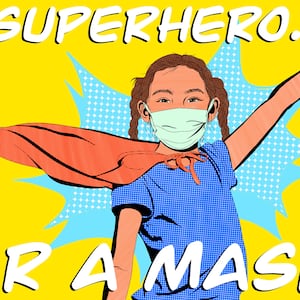First it was Israel. Then Germany. Soon, it seems increasingly inevitable, the United States will join the trend of announcing coronavirus booster shots to help bolster safe and effective vaccines—and stave off cascading surges of the pandemic fueled by dangerous new variants.
But whether or not Americans actually need a third immunization—or whether this practice should be restricted to only a few specialty populations with underlying conditions—has generated confusion and risked further lost confidence in the U.S. government’s messaging around COVID-19 vaccines.
You have every right to be confused. The discussions so far around a potential need for third mRNA immunizations—or a second J&J dose—often conflate many different arguments, assumptions, and public health goals. For example, do we need this booster because of true waning immunity for anyone who has been vaccinated against the coronavirus? Or is it because a third immunization would offer better protection against the new Delta variant now sweeping through the nation? Or do we need the booster only for selected populations such as those on immunosuppressive therapy, or older Americans who might not be responding to the vaccine?
Also: Would a booster shot be just a third dose of the same vaccines that are out there, as some people are already getting on their own without government approval, and are being rolled out in Israel and Germany with Pfizer doses? Or a new booster shot product, as Moderna—among others—has been developing in order to tailor it specifically for new variants of concern?
Adding to the confusion is the reality that very little data are being published in the biomedical literature. Instead, the information is coming to light through company press releases, powerpoint slides from shareholder meetings, or even through social media.
Even the actual goals of adding a booster are confusing. Is it to preserve the high performance of the current vaccine regimen in terms of keeping people out of the hospital and ICU? Or do we need to add immunization to stop symptomatic illness, including rare but accumulating so-called breakthrough cases? Or is it to continue slowing community spread, including transmission between asymptomatic individuals?
Here’s what we know so far based on publicly available data.
A study published in the New England Journal of Medicine in July, and sponsored by Public Health England in the U.K., found that a single dose of Pfizer BioNTech vaccine showed substantially diminished efficacy versus the Delta variant (30.7 percent) compared to the U.K. variant, previously known as B.1.1.7 and now known as the Alpha variant (48.7 percent). However, for fully vaccinated individuals receiving two doses, the effectiveness decreased only modestly from 93.7 percent versus Alpha to 88.0 percent versus Delta.
Confusingly, also in July, the Ministry of Health of Israel reported on its website that the efficacy of two doses of the Pfizer-BioNTech vaccine had declined to 64 percent against the Delta variant, although it remained 93 percent effective at preventing serious illness and hospitalizations.
Then, two weeks later, the ministry reported that the efficacy against infection and symptomatic illness had declined to 39 percent, while remaining very high—at 88-91 percent—against hospitalization or severe illness. The Israel data remain unpublished, and these results may be updated as the studies grow in size or methods used in the analysis are revised.
Finally, in the Real-time Assessment of Community Transmission (REACT-1) study from Imperial College London, investigators found that individuals fully vaccinated with either the Pfizer-BioNTEch or Astra-Zeneca Oxford vaccines exhibited a reduction in risk of infection, including asymptomatic infection, of around 50-60 percent compared to unvaccinated people.
For the U.K. and Israel studies, it remains unclear whether immunity has truly waned, or if the data point to diminished efficacy versus the Delta variant. The good news is that even if protective immunity is not as strong versus Delta, there is lots of evidence that fully immunized people are rarely requiring hospitalization even with breakthrough infections.
Still, one essential question looms: Given how well the vaccines are (still) working, does the FDA really want to change course? After all, according to some estimates, only 0.004 percent of those fully vaccinated have been hospitalized for COVID, while only 0.001 percent have died as a result of breakthrough COVID-19. It’s not clear that we need to recommend additional COVID-19 vaccinations to the general population in light of those numbers, and persistent anti-vaxxer problems.
A possible alternative: In anticipation of declining immunity and the Delta surge, perhaps the feds will do so along the lines of Israel by recommending boosters only for older Americans. The latest release from Moderna this week suggested that a third immunization produces a more robust antibody response against the Delta variant.
More imminent is the likely authorization of additional shots for individuals who are on immunosuppressive therapy. There are now two small published studies from the U.S. and France showing that solid organ transplant recipients achieve higher levels of virus neutralizing antibodies to the SARS-2 coronavirus if they receive three immunizations instead of two. In some cases, such patients do not achieve significant levels of virus neutralizing antibodies unless they get three doses. For the immunocompromised, the FDA is reportedly also looking into booster shots for all three COVID vaccines released for emergency use, possibly beginning with the Moderna vaccine first. Moreover, once these vaccines are formally approved by the FDA, it should be pointed out that physicians will have greater flexibility in prescribing additional immunizations, whether or not these vaccines are formally released for emergency use for immunocompromised individuals.
But no matter your health, there is a high likelihood that a third immunization will be necessary sooner or later in order to ensure resilience against emerging variants of concern across the globe. Both Moderna and Pfizer-BioNTech have publicly stated their view that such an immunization may be required by the fall due to declining immunity. There is particular concern about a new B.1621 variant now accelerating in Florida, which may have the ability to escape protective immunity even more than Delta.
Finally, there is the issue of vaccine equity, with Dr. Tedros Adhanom Ghebreyesus, the director-general of the World Health Organization, pleading with the U.S. and European nations to donate their mRNA vaccine doses rather than advance towards a third immunization. Such sentiments are totally understandable, given that we will ultimately require at least 4-5 billion doses to vaccinate the world’s low- and middle-income countries. However, sharing alone will not get us to 4-5 billion. This would require the U.S. or other nations to produce vaccines at a scale exceeding the current capability of mRNA vaccine manufacture, possibly including recombinant protein vaccines, such as the one my colleagues and I in Texas have developed in collaboration with India and other nations.
Ultimately, we must find a way to advance booster immunizations for the U.S. while ensuring vaccine access globally. This is achievable and must become our national priority. It’s imperative that the CDC and FDA do so with confident and clear messaging. It should be done with situational awareness and consideration around the now pervasive anti-vaccine aggression. The anti-vax attack will try to de-legitimize the effectiveness of these vaccines and we must counter by explaining how many if not most of our current vaccines require at least three doses. At the same time, there should be reassurance that we won’t be doing this in perpetuity. The third dose may be our last and there’s no evidence for needing an annual booster.
The U.S. has embarked on an extraordinary and successful COVID-19 vaccination program, but its legacy depends on this last mile.








